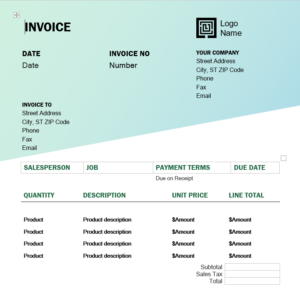Key Elements of a Proper Invoice
Question: When is an invoice, not an invoice?
Answer: When it’s not a proper invoice.
What are the elements of a proper invoice?
A proper invoice is a key component to deducting a business expense. A proper invoice contains the following key elements:
- The Word ‘Invoice’ - which specifies you are requesting payment vs providing a quote.
- Name and address of your company - Must be stated clearly to show who is requesting payment.
- Name and address of the client - The company required to make the payment.
- Date of invoice -When the invoice was generated.
- Payment terms - How long the client have to satisfy the invoice
- Date of service - Shows the date the product or service was rendered.
- Summary of Service - a description of the product offered or service performed
- Amount of the invoice - Sum of the invoice to be paid.
You can also add items such as a PO number to make the invoice more detailed, but the above elements are critical to create a proper invoice. If any one of the above elements are missing, the invoice is no longer an invoice.

Why is it important to have a proper invoice?
Businesses receive invoices for products or services. These expenses are deducted as ordinary and necessary business expenses. So far, so good!
Deductions are not entitlements
Supreme Court Case White v United States (1938) held that “Every deduction from gross income is allowed as a matter of legislative grace, and only as there is clear provision therefore can any particular deduction be allowed, and a taxpayer seeking a deduction must be able to point to an applicable statute and show that he comes within its terms.”
In other words, you can claim the deduction; however, you also have to be able to prove you are qualified to take the deduction and maintain proof that you are allowed to take the deduction. If you do that, you will continue to be able to take the deduction, as long as it is an ordinary and necessary expense for your business. Otherwise, the courts will remove said legislative grace and disallow the expense.
How to prove an expense
The IRS term for proving the existence of an expense is called substantiation. How does one substantiate (prove or provide evidence) an expense happened? One could use receipts, canceled checks, or bills. For the documentation to be deemed adequate, it must contain the date, amount, place, and description of the expense.
A canceled check alone does not substantiate an expense. A line item on your bank or credit card statement does not substantiate an expense. An invoice alone does not substantiate an expense. Each of these items, on their own, do not substantiate that an expense was incurred AND that it was paid.
A canceled check along with a bill would substantiate the expense. The bill shows there was an expense charged, and the canceled check shows the bill was paid. Both of those items together substantiate a complete cycle of the expense.
Remember when I started this post, I asked when is an invoice not an invoice?
In a recent tax court case, whose name escapes me at this time, an expense was disallowed, because the invoice was not complete.
Was there an invoice? Yes.
Was the invoice paid? Yes.
Was the expense ordinary or necessary? Yes. [Based on the what the plaintiff explained the expense was for]. BUT...
The invoice, however, did not show the date and description of the service rendered. The court explained that there was no way to tell what the payment was for based on the evidence provided. There was no way to determine if it was an ordinary or necessary business expense (other than the plaintiff's testimony). Therefore, the tax court disallowed the expense. The person who issued the invoice, did claim the income and pay tax as they should have. The plaintiff in the case also ended up paying tax on this money, because the expense was ultimately disallowed.
Business owners ensure that you are receiving proper invoices from your vendors and maintain those records FOREVER. When you file your taxes, store the tax return and all of the documentation together. In the event you are audited, you have everything already in one spot! If you've been selected for audit, reach out to us at ETS Tax Relief 877.482.9411.

